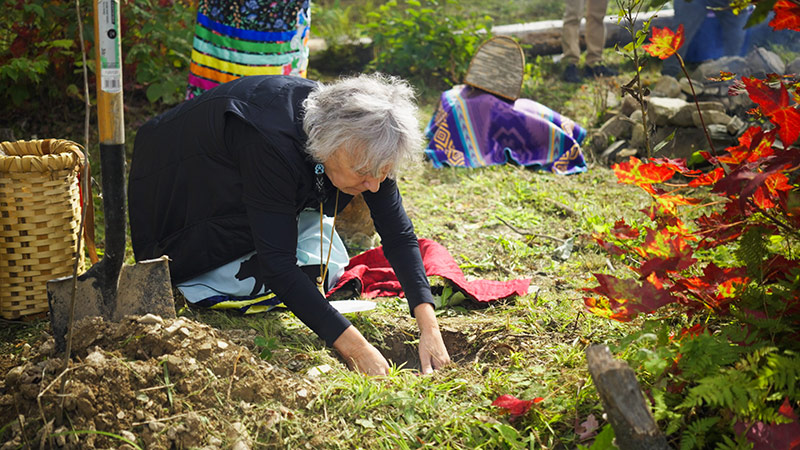How to improve Indigenous maternal health outcomes? Bring midwifery back to heal communities
Author: Marisa Lancione
Posted on Apr 28, 2023
Category: UNB Saint John

In 2022, Pilick, Kingsclear First Nation, a Wolastoqey community located 15 kilometres west of Fredericton, saw its first home birth in 85 years. The return of home births like this is a recent occurrence in Fredericton and the surrounding areas, made possible only because midwifery services are again available to families. While New Brunswick has publicly funded midwifery since 2016, access to services is limited with the province funding only four midwife positions in Fredericton since 2017.
However, Opolahsomuwehes (Dr. Imelda Perley), a Wolastoqi elder, knowledge keeper and doula from Sitansisk First Nation, has worked 20 years to bring birth back to Wabanaki communities. Her grandmother was an Indigenous midwife and, as a child, she saw many babies born with traditional Indigenous ceremonies and community support.
"All our women gave birth at home,” Elder Opolahsomuwehes said during the Indigenous Perspectives on Maternal Health event on the University of New Brunswick’s (UNB) Saint John campus. “It was such joy, but then colonization happened.”
Elder Opolahsomuwehes brought a sweetgrass braid and explained the significance of the sacred plant to Wabanaki communities and how it relates to Indigenous midwifery.
“We call it the hair of our Earth Mother, but also the seventh-generation teacher,” she said. “It’s that seventh-generation teaching that I’m sharing here today.”
Elder Opolahsomuwehes explained the ritual, respect and teaching that goes into gathering sweetgrass. She explained they never pick the first plant, but “we go all the way to the eighth [plant], knowing it is real medicine. It’s such an important responsibility and that is what this birthing process has to do with it. What are we leaving behind for future generations?”
During the Apr.13 event hosted by the faculty of arts on the Saint John campus of UNB, Elder Norma Don Juan Pérez from the Nahua people in the Anahuac joined Elder Opolahsomuwehes. Elder Don Juan Pérez is a human rights promoter, educator and social researcher. She is currently part of the Council of Women Leaders for the National Coordinating Committee of Indigenous Women (Coordinadora Nacional de Mujeres Indígenas or CONAMI).
“People think we are choosing midwifery because we are poor and cannot access state health care,” Elder Don Juan Pérez said while explaining the use of midwifery in Indigenous communities in Mexico. “We are experiencing ongoing colonization and racism as the Mexican state comes into our communities and dictates how we must give birth.”
In general, Indigenous pregnant women and their babies face poorer health outcomes when compared to their non-Indigenous counterparts. Bringing Indigenous midwifery back into Indigenous communities can have massive health implications. A 2019 study revealed that Indigenous mothers in Canada are at a higher risk of postpartum depression when compared to non-Indigenous Canadian-born mothers.
Elder Opolahsomuwehes recounted a testimonial she received from a mother she recently supported through pregnancy and childbirth.
“This was her third child, and [it] was the most special birth,” she said, explaining that after her two previous pregnancies, the mother had experienced postpartum depression, but this time was different. “She was ready for it because of the ceremonial aspect of the birth. So, she thanked us.”
For Indigenous women in Mexico, the maternal mortality rate is three times higher than their non-Indigenous counterparts. Unlike in Canada where the government publicly funds midwifery, it is still criminalized in Mexico.
“The state is scaring women from using midwives,” Elder Don Juan Pérez explained. “If a mother or child dies during birth, the mother or midwife is often sent to jail to discourage communities from seeking the care of a midwife.”
Mexico is working towards regulating midwifery but, like in Canada, they have pushed out the Indigenous traditions and ceremonies.
“They are making policies without consulting women or Indigenous midwives,” said Elder Don Juan Pérez. “They do not understand that midwives are part of our cultural heritage.”
In New Brunswick, Elder Opolahsomuwehes explained that Indigenous families faced barriers to incorporating Indigenous ceremonies into their hospital births. One of the most important ceremonies she offers families is placental burial during a naming ceremony.
“I had one doctor who actually charged one of my women [for her own placenta],” she said. “She didn’t have the money. She was so brokenhearted when I was doing the naming ceremony and she didn’t have her placenta.”
Elder Opolahsomuwehes worked with Horizon Health to help remove some barriers Indigenous families face when birthing in hospitals. Thanks to her efforts, there is a policy at the Dr. Everett Chalmers Regional Hospital (DECH) in Fredericton that grants Indigenous women the right to save their placentas for ceremonial purposes. She has also worked with Horizon to allow smudging in the hospitals.
Indigenous midwives uphold birth as a sacred event. They are central to the health and healing of Indigenous communities. Indigenous midwives bring birth home to many communities and restore traditions and ceremonies lost to colonization. With each new life, she heals wounds left by intergenerational trauma. As Elder Don Juan Pérez said, “Midwives are medicine.”
